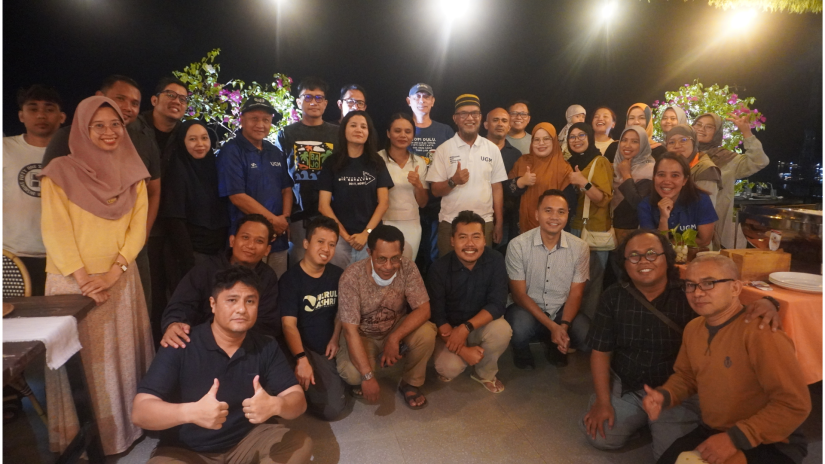
The Doctoral Program in Environmental Science, Graduate School of Universitas Gadjah Mada (UGM), organized an activity under the Lesser Sunda Expedition in collaboration with the Doctoral Program in Population Studies and the Doctoral Program in Geography. The target location of this expedition was the premium tourism area of Labuan Bajo. As part of the series of activities, an Interactive Talkshow was held between UGM representatives, partners, and alumni. The event, conducted on 3 July 2025, was attended by Prof. Eko Haryono and Dr. Sudaryatno along with the expedition participants, Dr. Leonard Chrysostomos Epafras (representing Public Relations and Collaboration of UGM Graduate School), representatives from Keluarga Alumni Gadjah Mada (KAGAMA) Manggarai Chapter led by Mr. Stefan, partners from Komodo National Park (TNK) represented by Mr. Ichwan, and academics from El Bajo Campus in Labuan Bajo.
(Activity Documentation)
The sharing and discussion session was moderated by Willem Amu Blegur, a doctoral student in Environmental Science from East Nusa Tenggara. The relaxed yet insightful discussion generated several key points.
Dr. Leonard Epafras highlighted that such an activity should not end here but should be followed by further research and collaboration in the future. His remarks were well received by the representatives of KAGAMA Manggarai, with Mr. Stefan expressing joy in welcoming fellow members of the UGM family.
“In 2023, UGM also visited Manggarai, and we warmly welcomed the Rector and her team for a fruitful discussion. However, the rapid development of Labuan Bajo also brings challenges, particularly the regional inequality it creates—urban centers are growing with impressive infrastructure, while the outskirts still face disparities in housing and income,” explained Mr. Stefan.
He further emphasized the hope that future joint activities could support the region’s progress, referring to ongoing collaborations with Prof. Dr. Gabriel Lele, M.Si., from the Faculty of Social and Political Sciences, UGM—one of Manggarai’s distinguished scholars.
The discussion continued with Prof. Dr. Eko Haryono, M.Sc., who invited several students to share their reflections.
Osmar Shalih, a doctoral student in Geography conducting research on disaster mitigation, noted that the development of tourism areas must consider environmental carrying capacity and spatial planning. “Water, electricity, and waste management are critical issues in tourism zones. We even found a sunken ship in the bay area, which poses a risk to local communities,” he added.
Natania Adel, a doctoral candidate in Population Studies, shared findings from her dissertation research in Labuan Bajo. “In several sub-districts, local residents are still unprepared for the transformation of Labuan Bajo into a Super Priority Tourism Destination (DPSP). Many communities across 12 sub-districts are reluctant to engage in mobility or new economic activities,” explained Natania, who is also from East Nusa Tenggara. Her insights shed light on the social readiness challenges faced by local populations amid rapid tourism growth.
(Activity Documentation)
Moderator Willem later guided the discussion toward the ecological foundation of Labuan Bajo’s development—its unique connection to Varanus komodoensis, the endemic Komodo dragon. Responding to this, Mr. Ichwan, representative of Komodo National Park, stated:
“Since the designation of Labuan Bajo as a Super Priority Tourism Destination (DPSP), there has been a significant surge in both domestic and international tourist visits. The government has transformed the Marina Beach—originally a traditional fish landing site—into a modern marina with facilities for tourist transport and hotels nearby. However, the increasing number of visitors has raised concerns about overcapacity on certain islands, particularly Padar Island, where carrying capacity has likely been exceeded.”
Addressing the issue of waste management, Mr. Iwan, known locally as “Om Sampah” (Uncle Trash) and an environmental practitioner focusing on plastic waste management, highlighted persistent challenges in community awareness.
“In two villages, only 10 out of 40 neighborhood units practice waste separation between organic and inorganic materials. We need scientific studies to help raise public understanding that waste can have economic value,” he explained.
This point was linked to a prospective research collaboration with Daniel Wolo, another doctoral student in Environmental Science from Universitas Flores, who is currently studying microplastic pollution in Kupang and aims to extend the findings to Labuan Bajo.
Academics from El Bajo Campus also shared valuable perspectives. They emphasized that the campus focuses on ecotourism, taxation, and accounting studies, and while they view the DPSP initiative positively, they also stressed the importance of addressing its environmental and social impacts.
“The local human resources must be strengthened and environmental sustainability must be prioritized. Therefore, we hope for continued academic collaboration with UGM in the near future,” one of the El Bajo faculty members stated.
In closing, Dr. Sudaryatno remarked that this discussion serves as an important motivation for doctoral students to stay enthusiastic in completing their dissertations while remaining aware of evolving societal issues that require empirical studies. He emphasized that the talkshow aligns closely with the principles of sustainable development and contributes to multiple dimensions of the Sustainable Development Goals (SDGs).
The event supported SDG 8 (Decent Work and Economic Growth) by promoting equitable regional development and improving community welfare; SDG 12 (Responsible Consumption and Production) through the advancement of sustainable waste management and resource efficiency; SDG 14 and 15 (Life Below Water and Life on Land) by emphasizing biodiversity protection and ecosystem preservation; and SDG 17 (Partnerships for the Goals) by fostering synergy among universities, local governments, communities, and tourism stakeholders—with Universitas Gadjah Mada leading as the pioneer of this expedition initiative.
Ultimately, the participants agreed that development should benefit local communities while preserving environmental integrity. Therefore, careful analysis, evidence-based planning, and preventive measures must guide every stage of implementation to avoid long-term ecological harm. It is hoped that this talkshow will serve as a foundation for future collaboration between UGM, KAGAMA Manggarai, government institutions, practitioners, and academics—continuing to weave strong threads of cooperation for the sustainable future of Labuan Bajo and Indonesia as a whole.
Writer: Willem Amu Blegur
Editor: Ulyn N




